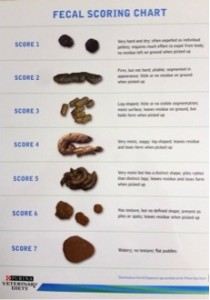
Editor’s Note: Healthy Paws is a new column sponsored and written by the owners of Clarendon Animal Care, a full-service, general practice veterinary clinic. The clinic is located 3000 10th Street N., Suite B. and can be reached at 703-997-9776.
Following up on our previous article about intestinal parasites, we thought a brief summary of diarrhea in general would be warranted.
What IS diarrhea?
Diarrhea is the abnormal (often rapid) movement of ingesta through the gastrointestinal tract, resulting in increased frequency or volume of stools with decreased form. Diarrhea can be the result of small intestinal disease/inflammation, large intestinal disease/inflammation or a combination of the two.
What are the most common causes of diarrhea?
There are far too many causes to cover in our limited space, but the most common include intestinal parasites, dietary indiscretion and rapid diet change. Viral infections, bacterial infections, and toxin ingestion are also relatively frequent causes. Most often, whatever the initial trigger, the diarrhea is perpetuated by an imbalance in the normal bacterial population in the gut — the “bad guys” — i.e. Clostridium, etc. — take over the “good guys” — i.e. Lactobacillus, etc. These bacteria then secrete toxins that can perpetuate the diarrhea.
Chronic diarrhea is defined as diarrhea lasting longer than three weeks. The potential causes for chronic diarrhea include the above causes, but also may warrant further investigation into the possibility of a food allergy/sensitivity, or of an underlying condition such as inflammatory bowel disease, pancreatic insufficiency or other system or metabolic disease.
A fecal sample is typically the first diagnostic test ordered, as this screens for intestinal parasites such as roundworms, hookworms, whipworms, Giardia, and Coccidia. Additional tests such as blood work, x-rays, or even fecal pathogen testing or cultures (to look for Salmonella, and other bacterial and viral infections) may be recommended based on the symptoms. In some cases biopsies of the small and or large intestine may be indicated to diagnose certain inflammatory conditions or cancer.
What can you do at home?
There are several things that you can do at home that may help improve an uncomplicated case of loose stools. A bland diet is one of the mainstays of treatment. We typically recommend a 50/50 mixture of boiled boneless/skinless chicken breast and white rice, divided into several smaller meals throughout the day. If your pet has a possible allergy to chicken, you can discuss with your veterinarian alternatives to chicken.
We are often asked if Pepto-Bismol or similar products can be administered at home. These products are strongly NOT recommended, as they often contain salicylate, an aspirin derivative which can be toxic to dogs and cats and may even exacerbate the GI upset. Imodium (loperamide) can be used safely in some breeds, but please consult with your veterinarian first as certain breeds are predisposed to inherited genetic metabolic defects in which this drug can cause severe neurologic problems.
What treatment will the veterinarian prescribe?
Well, that depends on the clinical symptoms and diagnostic results of fecal and other testing. We often treat with antibiotics, bland diet and probiotics – but may also need to reach for prescription diets (e.g. hypoallergenic diets, low fat diets, highly digestible diets), anti-inflammatories such as steroids, deworming medications and vitamin B-12 injections to name a few therapeutic options. When diarrhea is secondary to an underlying metabolic or systemic disease – that underlying disease needs to be addressed. We tailor our treatments to the individual pet and make sure we are assessing response and making changes to treatment in a timely manner.
When should you be concerned?
We recommend calling your veterinarian after two consecutive episodes of diarrhea, or right away if the diarrhea is grossly bloody or black/tarry or is accompanied by other clinical signs such as decreased appetite, vomiting, lethargy, or pain.
The views and opinions expressed in the column are those of the author and do not necessarily reflect the views of ARLnow.com.


